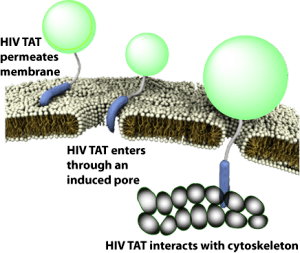Cell-penetrating peptides (CPPs) have the ability to enter a cell’s plasma membrane independent of a membrane receptor. Attached to a CPP, therapeutic cargo could be delivered to an intracellular target, thus overcoming the entry restrictions set by the plasma membrane.
Peptide Synthesis & Cell Penetration
The cationic CPPs interact with negatively charged head groups of lipids directly in the plasma membrane through electrostatic interactions. The increased local peptide concentration at the membrane surface will cause a transient destabilization of the lipid bilayer and lead to cell entry. The hydrophobic interactions, especially facilitated by the presence of tryptophan residues, may be important for the CPP-membrane interaction and cellular internalization.
Please click here for more details for cell penetrating peptide synthesis services: http://lifetein.com/Cell_Penetrating_Peptides.html
+LifeTein
Peptide Synthesis Home Page
Our Services:
COVID-19 Services & Products
Custom Antibody Services
Rush Peptide Synthesis
Peptide Nucleic Acids (PNAs)
Custom Peptide Synthesis Services
Gene Synthesis Service
Custom Chemical Synthesis
Other Posts:
Amino acid composition of cell-penetrating peptides (CPPs)
Obesity Treatment: A New Peptide Drug
D-amino acid peptides to resist common proteases
Synthetic Peptide Vaccine Research: Problems and Accomplishments

